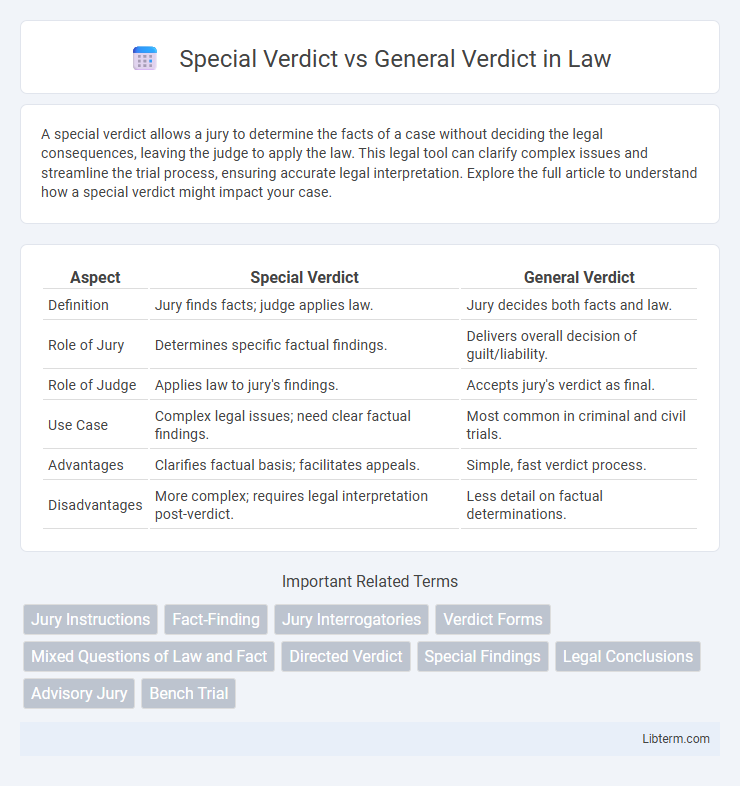A special verdict allows a jury to determine the facts of a case without deciding the legal consequences, leaving the judge to apply the law. This legal tool can clarify complex issues and streamline the trial process, ensuring accurate legal interpretation. Explore the full article to understand how a special verdict might impact your case.
Table of Comparison
| Aspect | Special Verdict | General Verdict |
|---|---|---|
| Definition | Jury finds facts; judge applies law. | Jury decides both facts and law. |
| Role of Jury | Determines specific factual findings. | Delivers overall decision of guilt/liability. |
| Role of Judge | Applies law to jury's findings. | Accepts jury's verdict as final. |
| Use Case | Complex legal issues; need clear factual findings. | Most common in criminal and civil trials. |
| Advantages | Clarifies factual basis; facilitates appeals. | Simple, fast verdict process. |
| Disadvantages | More complex; requires legal interpretation post-verdict. | Less detail on factual determinations. |
Understanding Verdicts: Special vs General
Special verdicts require the jury to find facts based on specific questions posed by the court, allowing judges to apply the law accurately, while general verdicts entail the jury delivering a simple decision of guilt or liability without detailed factual findings. In civil cases, special verdicts help clarify disputed issues by breaking down complex facts, whereas general verdicts streamline the outcome into a straightforward verdict of "liable" or "not liable." Understanding these verdict types is essential for comprehending how courts balance factual determinations with legal judgments.
Definition of General Verdict
A general verdict is a jury's final decision in a trial that directly resolves the case by determining the facts and applying the law, resulting in a conclusive judgment for either the plaintiff or defendant. Unlike a special verdict, which requires the jury to answer specific factual questions separately, a general verdict delivers a broad, overall conclusion without detailed factual findings. This type of verdict streamlines the legal process by providing a clear and comprehensive outcome without dissecting the underlying issues.
Definition of Special Verdict
A special verdict is a judicial determination where the jury finds the facts but does not apply the law, leaving the judge to make the final legal ruling based on those findings. Unlike a general verdict, which delivers a straightforward decision of guilt or liability, a special verdict breaks down the decision into specific factual questions answered by the jury. This method allows judges to independently interpret legal consequences, ensuring precise application of law in complex cases.
Key Differences Between Special and General Verdicts
Special verdicts require the jury to make specific factual findings, which the judge then applies to the law, while general verdicts involve the jury deciding the case's outcome based on the facts and law combined. Special verdicts provide detailed answers to particular issues, allowing for precise judicial application, whereas general verdicts deliver a simple, final decision of guilt or liability. The key difference lies in the level of jury involvement in factual and legal determinations; special verdicts separate fact-finding from legal conclusions, promoting clarity and judicial oversight, unlike general verdicts where the jury's verdict fully resolves the case.
Legal Contexts for Special Verdicts
Special verdicts in legal contexts require the jury to find facts rather than deliver a general conclusion of guilt or liability, allowing the judge to apply the law accordingly. This process ensures precise factual determinations on specific disputed issues, which can be critical in complex cases involving intricate legal standards or multiple claims. Special verdicts often enhance judicial efficiency by providing clear guidance for subsequent legal rulings and reduce ambiguity in trial outcomes.
Legal Contexts for General Verdicts
A general verdict in legal contexts refers to a jury's decision that resolves all issues in a case in favor of one party without specifying findings on individual facts. This type of verdict allows the jury to determine liability or guilt based on the overall evidence presented, streamlining the judicial process by avoiding detailed factual determinations. General verdicts are commonly used in civil and criminal trials, providing a conclusive judgment that guides the final judgment by the court.
Advantages of Special Verdicts
Special verdicts provide precise findings on specific factual issues, enabling judges to apply the law more accurately and consistently. They reduce ambiguity by clearly outlining each party's liabilities and responsibilities, thus facilitating focused judicial review and potential appeals. This method enhances transparency and accountability in legal decisions, improving the overall fairness and reliability of verdicts.
Advantages of General Verdicts
General verdicts simplify the decision-making process by allowing juries to deliver a clear and concise determination of guilt or liability without assigning specific factual findings. This approach reduces the risk of inconsistent or confusing verdicts, promoting judicial efficiency and expediting case resolution. Courts often favor general verdicts for their flexibility in application, which facilitates easier appellate review and preserves the integrity of the jury's overall judgment.
Impact on Appeals and Judicial Review
Special verdicts provide appellate courts with explicit factual findings from the jury, enabling more focused judicial review and often limiting grounds for overturning verdicts. General verdicts, which represent a single conclusion on liability or guilt without detailed factual determinations, pose challenges for appeals because appellate courts must infer the basis of the jury's decision, increasing the likelihood of affirming the trial court. The clarity in special verdicts can streamline appellate processes but may also invite more frequent legal challenges on the sufficiency of those findings compared to the broader, less specific general verdicts.
Choosing Between Special and General Verdicts
Selecting between special and general verdicts depends on the case complexity and desired clarity in jury findings. Special verdicts require jurors to answer specific factual questions, providing detailed insight into each element of the claim, which aids judges in legal interpretation. General verdicts deliver a simple decision of liability or innocence, suitable for straightforward cases where detailed jury reasoning is unnecessary.
Special Verdict Infographic

 libterm.com
libterm.com